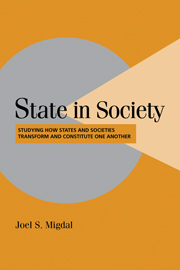Book contents
- Frontmatter
- Contents
- Acknowledgments
- Part I Introduction
- Part II Rethinking Social and Political Change
- Part III A Process-Oriented Approach: Constituting States and Societies
- Part IV Linking Micro- and Macro-Level Change
- Part V Studying the State
- 7 STUDYING THE POLITICS OF DEVELOPMENT AND CHANGE: THE STATE OF THE ART
- 8 STUDYING THE STATE
- Bibliography
- Index
- Titles in the series
8 - STUDYING THE STATE
Published online by Cambridge University Press: 05 September 2012
- Frontmatter
- Contents
- Acknowledgments
- Part I Introduction
- Part II Rethinking Social and Political Change
- Part III A Process-Oriented Approach: Constituting States and Societies
- Part IV Linking Micro- and Macro-Level Change
- Part V Studying the State
- 7 STUDYING THE POLITICS OF DEVELOPMENT AND CHANGE: THE STATE OF THE ART
- 8 STUDYING THE STATE
- Bibliography
- Index
- Titles in the series
Summary
Over the course of the twentieth century, comparative political scientists' core questions have changed very little. From Weber and Gramsci to Almond, Verba, and Skocpol, their concerns have centered on why people obey and on what sorts of structures and cultures facilitate obedience and conformist behavior. The elements that political scientists have singled out for investigation as the key to understanding obedience and conformity have included the usual suspects: parliaments, bureaucracies, governmental leadership, courts and law, and police and military. These form the constituent parts and parameters of that complex and somewhat elusive structure called the modern state – the mountain that all political scientists sooner or later must climb.
In the pages ahead, I will make several central points. First, in the next section, I will argue that, despite the assault on the state from a number of directions, it will remain central to the study of comparative politics well into the twenty-first century. Second, in part due to the overwhelming influence of Weber on the study of the state, various perspectives – culturalist, rationalist, and institutionalist – have tended to isolate it as a subject of study, peering into its innards and poring over its organization in order to understand how it succeeds in gaining obedience and conformity from its population. This sort of analytic isolation of the state, I will claim, has led to a mystification of its capabilities and power.
- Type
- Chapter
- Information
- State in SocietyStudying How States and Societies Transform and Constitute One Another, pp. 231 - 264Publisher: Cambridge University PressPrint publication year: 2001

